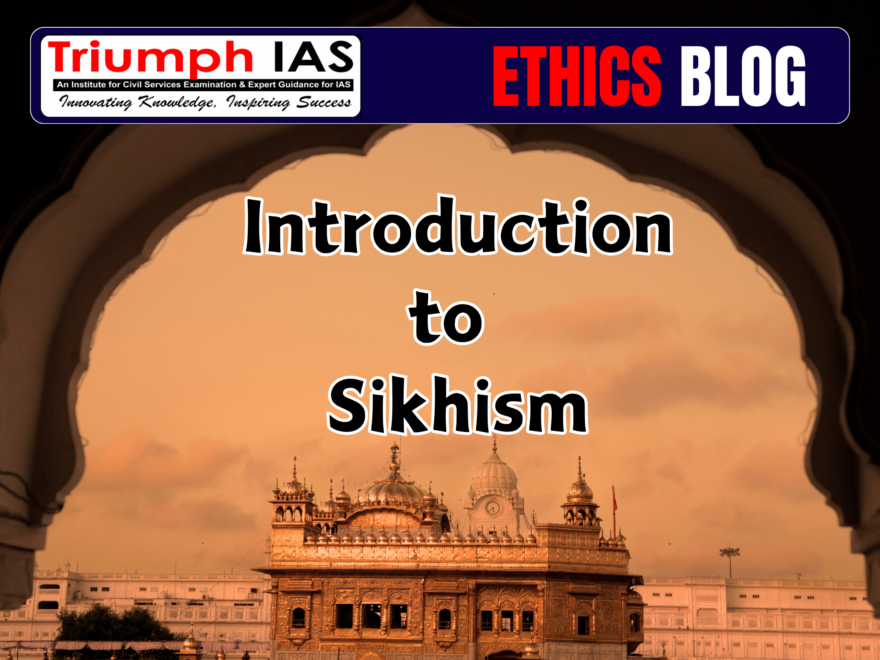
Introduction to Sikhism
[Relevant for Public Ethics, Integrity and Aptitude]

Introduction to Sikhism
One witnesses questions in the Ethics Section A portion which concerns with some religious (and/or panths) movements which changed the course of socio-cultural movements of that time and beyond. Further, such movements also while bringing in paradigm changes in the society also originated from the slack mentality of the prevailing times.
Today, in this blog I would be discussing Sikhism – word that comes from the original word Shisya i.e. disciple one who is willing to learn. In this sense, the Sikhs are the disciples of the 10 Sikh Gurus starting from Guru Nanak.
Sikhism Comes From the Word Shisya the disciple
Sikhism was founded by Guru Nanak 1469-1539 in the 15th century AD in the present-day Punjab.
Sikhism, the youngest of the world religions, has integrated ideas, practices and doctrines mainly from Islam and Hinduism. Like the golden temple with open doors to all sides, Sikhism is a liberal religion open to other religions and cultures.
Like many other religions, Sikhism also has undergone transformation and accommodates paradoxes in its existence like simplicity and splendor, military prowess and tenderness, and poetry and pragmatism. Most of the Sikhs live in the state of Punjab, the others in Haryana, Delhi and in other parts of India. Many have migrated also to western nations particularly United States, Canada.
Socio-Religious Background Of Sikh Religion
The Mughal rulers exploited the poor economically and persecuted the Hindus in the name of religion, imposed a religious tax on them and conducted forced mass conversion.
The Brahmins, the dominant class in the Hindu society, though submissive to the Muslim rulers, were intolerant towards the lower class. The life of an ordinary Hindu was miserable because he was politically exploited by the Mughal rulers and religiously exploited by the high caste Brahmins. Rampant social evils like sati, child marriage, the dehumanising caste system and female infanticide aggravated the misery of the ordinary people. The socio-cultural milieu was ripe enough for a transformative movement. That was the time Guru Nanak appeared on the scene with his liberal ideas on God, religion and social life.
Nanak found that the kings have become man-eaters, their officials behave like dogs, they lick blood and eat flesh of people. He lamented, O God, thou who art the Lord of us all, didst thou not feel pain when there was so much slaughter and lamentation?
The origin of the Sikh religion can be traced back to the Vaishnavite Bhakti tradition which started in Tamil Nadu as a protest movement against the Brahmin hegemony over the Hindu rituals and the dehumanizing caste system and the Islam-Sufi mysticism.
Lalla, a Kashmiri Vaishnavite saint, Namdev, a Vaishnavite saint and poet, Ramananda of Banaras and Kabir, the Sufi mystic, considerably influenced the religious atmosphere of the time.
Guru Nanak And His Life
Guru Nanak was born into a Hindu family in the village of Talwandi of a Muslim Jamindar, 65 km away from Lahore. His father, Mehta Kalu, was a revenue collector belonging to the Bedi, conversant with the Vedas, sub-caste of the Kshatriyas.
He inherited the name Nanak from his mother’s father. After his education, he got married to a girl in Sultanpur and had two children. For a while he worked as the accountant of Daulat Khan, the Afghan chief in Sultanpur.
Later he came in contact with a Muslim servant, Mardana. Mardana gave music to the hymns composed by Nanak and together they conducted community singing.
Ethical Teachings
Sikhism basically is an ethical religion based on three fundamental concepts, work, worship and charity, kirt karo, naam chappo and vand chakho.
Self-reliance is the greatest obstacle to God-realization which is manifested in lust, anger, greed, materialism and pride. Guru Nanak remarked, sweetness and humility are the essence of all virtues.
It is a householder that a Sikh should seek God-realization. The householder who gives all he can afford to charity is as pure as the water of the Ganges. God-realization through renunciation is easy but it is more challenging and difficult while being actively involved in the world. Guru Nanak said, “Do not covet your neighbor’s position. Without the name we cannot attain inner peace nor still our inner hunger. The Guru has shown me the real life of the city, the real life of its shops. It is the inner life. We must be traders in truth, moderate in our eating and sleeping. This is true Yogism.”
As a reaction to the then existing social evils, Sikhism was against the caste system and demeaning the status of women.
The Harmindar at Amritsar had four doors open to all the four castes. Sikhism accepted people of all denominations irrespective of their caste or social status. Hereafter, no one is distinguishable by caste.
Guru Arjan spoke about the Adi Granth that this divine teaching is for everyone, Brahmin, Kshatriya, Vaishya and Shudra. Whosoever utters the name which lives in all hearts under the Guru’s instruction is delivered from this age i.e. Kalyug.
Guru Nanak, as a spiritual preceptor, followed the principle of non-violence even in slavery and violence by the Babur’s army. He even considered the Mughal invasion as the chastisement by God for the evils of the people. Are you pitiless creator of all? You have sent Yama, that is God of Death disguised as the Mughal. Did you feel no pity for what happened for the screams of those who cried in agony?
The Concept Of God And Sikhism
Sikhism teaches uncompromising monotheism. In the Mool Mantra, Nanak described God as by the grace of the soul, one, self-existent and immanent, the creator-person, without fear or unconditioned, without enmity or uncontradicted, the timeless one, unincarnated, self-created and enlightener.
Sikh gurus repeatedly assert the monotheistic character of God by saying God is the one, the only one, the one without a second. Though the understanding of God in Sikhism is strictly monotheistic, it accepts two aspects of God, the nirguna and the saguna. God Parameshwar in his nirguna aspect is beyond all attributes including Sat, Akal and Agni. In the saguna aspect, God is attributed qualities like Shabad i.e. word, Naam i.e. personality and Guru i.e. enlightener.
#EthicsBlogoTerms
Related Blogs …
Follow us :
🔎 https://www.instagram.com/triumphias
🔎 https://www.youtube.com/c/TriumphIAS
🔎 https://t.me/VikashRanjanSociology
Find More Blogs…
| Compare and contrast Karl Marx’s and Max weber’s | Karl Marx- Historical Materialism |
| Position of Women In the Modern Indian Society | Sociology: Social system and pattern variables |

